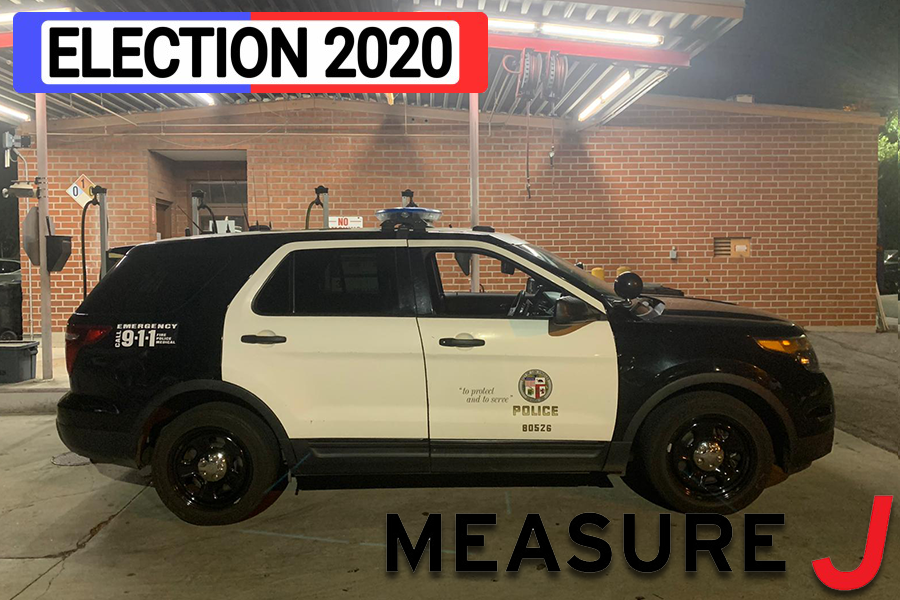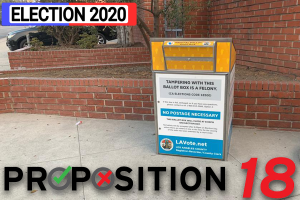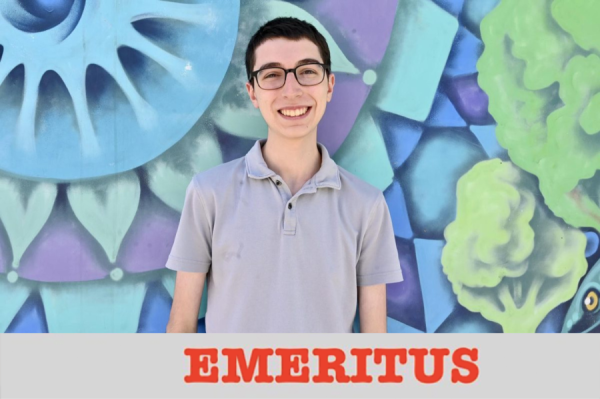Measure J hopes to answer George Floyd protests by reallocating some county funds
If passed, would set aside 10% of county general spending to fund job training, small business, health care and — especially — alternatives to jail
DEFUND? Measure J on the Los Angeles County ballot would reduce the percentage of county dollars available for sheriff’s and jail funding.
October 30, 2020
Editor’s Note: On Tuesday Nov. 3, Measure J passed with 57% of voters supporting the measure and 43% opposed.
With racial justice becoming a higher priority for them, the Los Angeles County Board of Supervisors decided over the summer to ask voters whether they should place 10% of county funds off-limits for law enforcement and incarceration, and instead direct it to programs designed to address injustice.
By a vote of 4-1 on Aug. 4, the supervisors voted to put a proposal on the ballot in next week’s election called Measure J.
Measure J would direct 10% of the County’s locally generated unrestricted revenues in the general fund towards social and economic programs and alternatives to imprisonment and away from law enforcement.
Its backers designed it to address “the disproportionate impact of racial injustice,” according to the proposal’s title. It would reserve 10% of the county’s unrestricted funds in the budget for community programs and alternatives to incarceration, not permitting that 10% to go to any county law enforcement agency, including the LA County Sheriff’s Department or the District Attorney’s office.
Instead, that percentage of the county’s unrestricted general funds would have to be directed towards activities such as job training for low-income residents and pre-trial services that don’t require arrestees to remain in custody.
Also included would be youth development programs, job training, and jobs for low-income residents, along with health services in low-income neighborhoods and housing assistance for the homeless.
Mr. Spike Friedman, an organizer for Ground Game LA, called the proposition a “common-sense version” of calls from Black Lives Matter and other groups to cut the budgets of law enforcement agencies. Ground Game LA is a grassroots group that works on behalf of vulnerable communities,
“‘Defund the police’ means a lot of different things to different people,” Mr. Friedman said in an interview with the Boiling Point last week. “But at its core it is about the reallocation of resources away from law enforcement and towards the sort of services that create a more equal community.”
The measure’s official ballot description states that it would fund programs for “community investment and alternatives to incarceration.”
Mr. Friedman said that due to the uprisings in Minnesota in the wake of George Floyd’s killing by police officers — who restrained him with a knee on his neck for more than eight minutes — the supervisors felt a need to take action.
“They wanted to act in a way that was democratically influenced,” Mr. Friedman said, “so I think by putting this on the ballot in LA County, the Board of Supervisors created a situation where they will have a real mandate to change the status quo in the county.”
The Boiling Point was not able to find a spokesperson for Measure J’s opponents. But in the county’s official Voter Information Pamphlet, the opponents say voters should not be asked to permanently divert $500 million from law enforcement and other county services to fix racial injustices going on throughout L.A.
The reason, they say, is that those dollars are already going to help those communities — partly because many county workers come from and work in communities of color.
“Many of the people and communities who need additional investments to succeed in today’s difficult economy would lose nearly half a billion dollars in resources under Measure J,” says the opponents’ statement in the pamphlet, which was mailed last month to all registered voters in Los Angeles County.
But Mr. Friedman countered that just three years ago, the Los Angeles County Sheriff’s Department budget was 10% lower than it is today, so even taking all 10% just from the Sheriff’s department would not have a devastating impact.
The actual difference is closer to 8%, but it’s clear the Sheriff’s Department budget has been growing. According to the County of Los Angeles’s 2016-17 final adopted budget, the Sheriff’s Department was allocated $2.3 billion, and in 2019-20 it received $2.5 billion — an increase of 8% over three years.
According to the voter pamphlet, Measure J would permanently shift $500 million into “growing the government bureaucracy” and away from the essential services and jobs in those communities.
Funds from the 10% savings would also be directed towards small businesses in need of capital, with a particular focus on Black-owned businesses, along with rent assistance, housing vouchers, and supportive services for those at risk of losing their homes.
There would also be funding for people in need of “transitional, affordable, and supportive housing” — in other words, people and families who are homeless or unhoused.
No on Measure J, a group opposing the measure, says on its website that the county has spent hundreds of millions of dollars to fix other crises, but those exact problems have only gotten worse, and that the new plan would take money from essential workers.
“We need to fix systemic racism, but shifting nearly $500 million away from other essential services to pay for unspecified programs is not the way,” the website states. “Measure J could have devastating and far-reaching consequences for vital services like 9-1-1 emergency response, public health services, firefighting aircraft and other first responder vehicle maintenance.”
But Re-Imagine Los Angeles, a group leading the campaign in support of this measure, says on its website that a shakeup was needed.
“It’s time to invest in community counseling, mental health services, youth development programs, small businesses, jobs-creation, and affordable housing,” states Re-Imagine LA. “Individual elected leaders come and go. Measure J will structurally change the budget and permanently enshrine our values in the county charter.”
Measure J would also redirect funds to alternatives to incarceration, including new programs giving options to arrestees and convicts other than just going to jail.
Other programs would involve community-based health services, meaning that an arrestee could go through treatment and partake in other services before their trial.
Mr. Friedman said the jail system can be very hard for some people — that the experience of losing your freedom when you are already poor, or already restricted by hurtful systemic forces like unequal healthcare, schools, and access to jobs and good education is a very hard situation for people to go through.
“I think we need to find ways to not send people to jail if their crimes are related to poverty,” Mr. Friedman said. “If their crimes are related to addiction or mental health, we need to find other solutions to those answers that are non-punitive.”
No on Measure J agrees that Los Angeles County needs to fix systemic racism, but says shifting $500 million away from other necessary services to pay for services and programs that have not been specified is not the way.
“Measure J defunds the essential workers we count on to protect us,” states No on J. “Measure J could have devastating and far-reaching consequences for vital services like 9-1-1 emergency response, public health services, firefighting aircraft and other first responder vehicle maintenance.”
But Mr. Friedman doubts such an impact would be great.
“I don’t think what we’re talking about is a seismic shift in massive amounts of stations closing, or officers being laid off,” he said. “I think we’re seeing a correction in terms of too much growth in terms of spending on this particular law enforcement agency, that over the last three years has revealed itself to be particularly problematic when it comes to the issue of racial justice.”
He said the sheriff’s department already causes harm to county residents because of the way it is being led right now, so taking money away from them, is on its own, a strong statement about the need for racial justice.
“The fact that this also redirects things towards much needed funds for historically disadvantaged communities,” he said, “only makes this a more beneficial measure for LA County.”
















